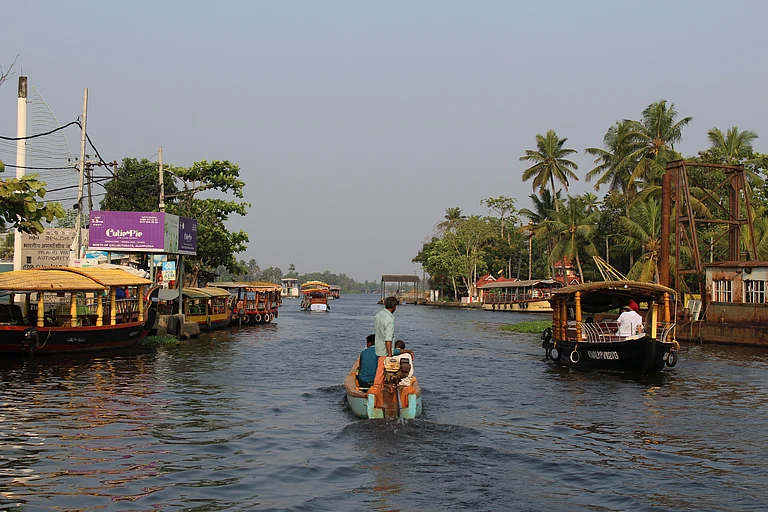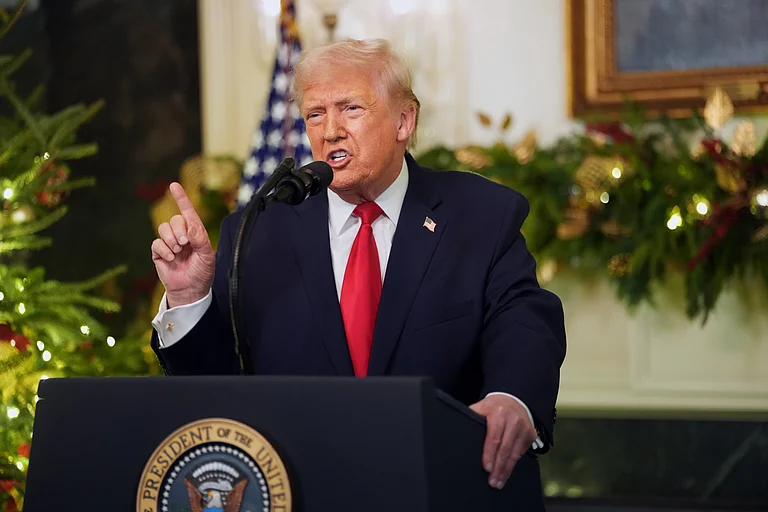This article was published in the Outlook magazine issue 'One Nation, One Election/One Nation, Many People' dated October 1, 2023. To read more article from the issue, click here.
The Indian Union is not a nation in the European sense of the word. A nation, in its original conception, was meant to be an ethno-linguistic unit. India is anything but that. England, for example, is a nation. But Britain —which includes England, Scotland, and Wales— isn’t. Similarly, Denmark is. The Kingdom of Denmark, which includes Faroe Islands and Greenland as well, isn’t.
To treat India as a nation, therefore, is absurd in many ways — firstly, because of its size and scale. To treat 1.4 billion people who speak hundreds of languages from entirely different language families as one nation is pointless. These people are also ethnically diverse in the extreme. That they came together to form a Republic that’s a Union of States is no reason to club them together as a nation.
We don’t meet the old definitions of a nation. The modern Republic of India has within it such diverse and disparate states in terms of development metrics that treating them as a single entity from a governance standpoint makes no sense. For example, in the most basic aspect of governance —healthcare— Kerala’s health metrics can be compared to that of the United States while Madhya Pradesh’s can be compared to Afghanistan. To treat the United States and Afghanistan as one unit when it comes to making choices on policy is absurd. That the Indian Union has been seeking to centralise policymaking across these disparate states with divergent and opposing policy needs is problematic enough. Now it seems to want to have unified elections. If this were a black comedy, we’d think it’s too fantastical.
Firstly, the problem with a unified election cycle for legislators who’d form the state and Union governments is logistical. Do we then implicitly assume all governments will last five years? Or, are we going to have an Italy-style government then, where, even if one government fails, Parliament or legislature still continues for the rest of the term? If that’s the case, isn’t this a fundamental change in our democracy, which goes well beyond tinkering with the election schedule.
The reasons that proponents of the unified schedule cite are that it is cost-effective and keeps politicians from living in a campaign mode forever. That is weak sauce even if the claims were true. They aren’t. This is a solution that’s not even wrong.
The biggest problem in India at this point is the overt centralisation of policymaking for what are extremely divergent states. A single policy for states with contradictory needs serves no one except those in power. Consider Kerala, where past gains and demographic changes have made geriatric care and diabetic care the most important aspect of public health. This would mean a set of measures that are directly at odds with the needs of Uttar Pradesh where basic nutrition and high infant mortality are the issues to address.
Union governments and politicians in charge of that government seek to grab power that belongs to state and local governments. This is not unique to any one party or government; it has been a feature of independent India. The Union government is able to do this simply because it is the more powerful government in our Constitutional design with almost monopolistic access to the powerful resource — tax collections.
An obvious solution here, one would think is the weakening of the Union government and strengthening the states by making tax collection and appropriation diffused, enabling states to implement what’s in the best interests of their citizens. Unified elections instead strengthen the hand of the already powerful Union government and weaken states even further, achieving the opposite of what’s needed.
Consider health. The Union government designs policies and forces Kerala, India’s best state on health metrics, to adopt them despite being suboptimal. These are policies that are originally under the purview of state governments, but the power of the purse enables the Union to arm-twist Kerala. The Union usurping those powers is a problem that can be at least somewhat addressed by having a separate election for the state where people reject the policies of the Union and therefore the party in power there when the elections for the state happen asynchronously.
Unified elections will mean the electorate in that state will have no ability to wield their votes as a weapon against such sub-optimal policy choices being thrust upon them.
The foundational questions that the proponents of unified elections seem to miss are — what are states? Why do we have elections? And what does a government do?
If we see states in India for what they are —large linguistic units with a distinct cultural and historic past, with populations that are often larger than the largest European countries— the answers are clear. State governments exist as a representation of people’s will to effect actual governance that impacts the lives of people. Or, they are nations themselves. And their citizens should be able to vote and transmit their preferences through their state governments, independent of what the Union government says or does.
If the Union government thinks it is in permanent election mode, the solution is simple — its elected officials should stop campaigning for state elections to start with and go on to give up enacting any and all policy that happens to be on the state or the concurrent list of subjects. To go and meddle with policy that’s not theirs to meddle with and then claim the reason they are unable to do their jobs well is that the unwarranted meddling is not easy is something only politicians can come up with.
Representatives in a representative democracy are a means to an end. The purpose of a democracy is the representation of people’s will in their government. Nowhere in this scheme should the need of representatives be prioritised over and above the representation itself. And the various governments —Union, state and local— exist for the same reason. One government cannot and should not impose its prerogative on other governments for its own benefit either. Elections exist to choose said representatives and governments; they, therefore, can’t obviously be designed for purposes other than the just representation of people’s will. Or, the Union government or people in it should not have any say in how state elections are run.
(Nilakantan R S is the author of ‘South Vs North: India's Great Divide’. Views expressed are personal.)


















